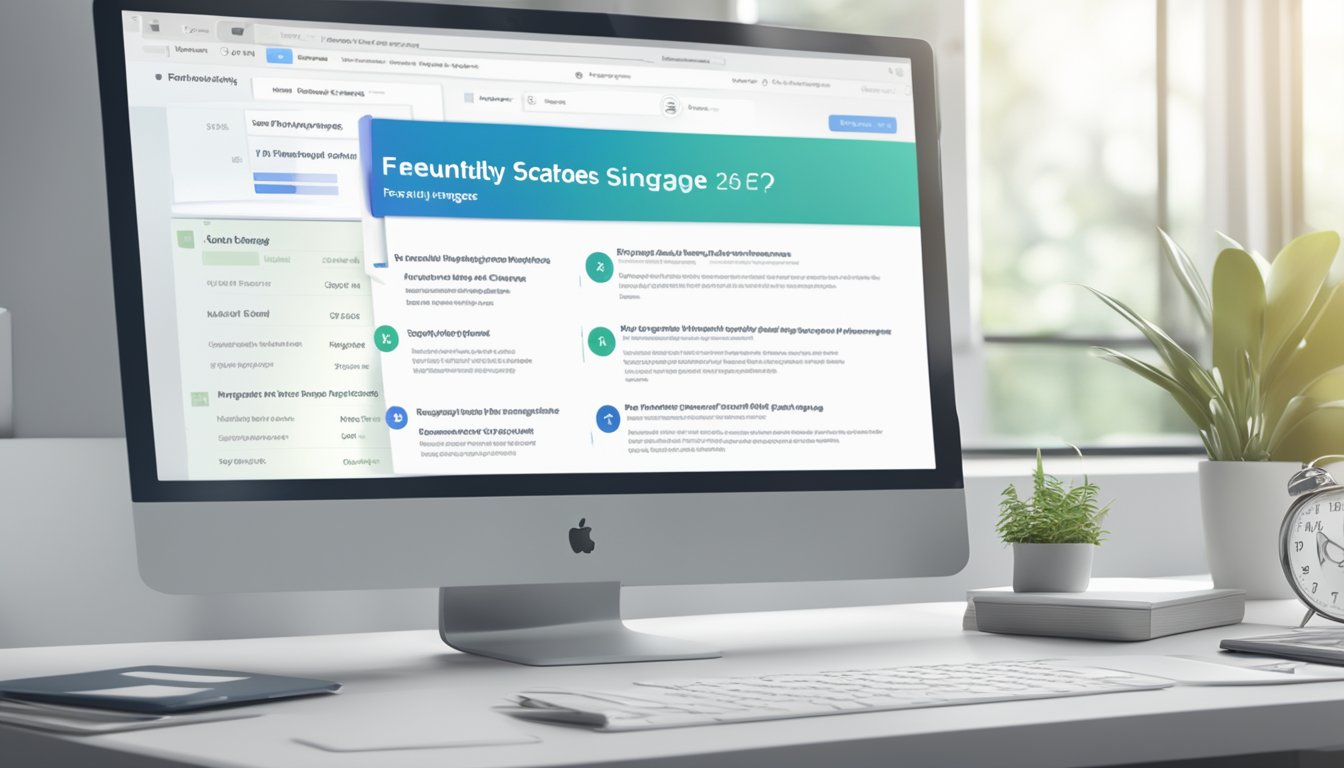If you’re looking to buy a home in Singapore, you’ll likely need a mortgage to finance your purchase. With so many different lenders and home loan options available, it can be overwhelming to navigate the process and find the best rates. However, taking the time to understand mortgage rates in Singapore and compare your options can help you save money and secure the best deal for your needs.

Mortgage rates in Singapore can vary widely depending on a variety of factors, including the type of property you’re purchasing, your credit score, and the size of your down payment. It’s important to shop around and compare rates from different lenders to ensure you’re getting the best deal possible. Additionally, many lenders offer promotions and incentives that can help you save even more on your home loan.
When comparing mortgage rates in Singapore, it’s important to consider both fixed and variable rate options. Fixed rate mortgages offer the security of a consistent monthly payment, while variable rate mortgages may fluctuate over time but can offer lower rates initially. By understanding your options and comparing rates from different lenders, you can find the best home loan deals and save money over the life of your mortgage.
Key Takeaways
- Understanding mortgage rates in Singapore is crucial to finding the best home loan deals.
- Comparing rates from different lenders, considering fixed and variable options, and leveraging promotions and incentives can help you save money.
- Refinancing your home loan and taking advantage of government schemes and subsidies can also help you secure the best deal possible.
Understanding Mortgage Rates in Singapore

If you’re looking to purchase a property in Singapore, you’ll likely need to take out a mortgage. Mortgages come with interest rates, which determine how much you’ll pay in interest on your loan. Understanding how mortgage rates work can help you make an informed decision when choosing a home loan.
Fixed vs Floating Interest Rates
When it comes to mortgage rates, there are two main types: fixed and floating. Fixed-rate mortgages have a set interest rate that remains the same for the entire term of the loan. Floating-rate mortgages, on the other hand, have an interest rate that can fluctuate over time.
Fixed-rate mortgages are popular among homebuyers who want the security of knowing exactly how much they’ll pay each month. Floating-rate mortgages can be more unpredictable, but they also have the potential to save you money if interest rates drop.
SIBOR, SOR and SORA Explained
In Singapore, mortgage rates are often tied to one of three benchmark rates: the Singapore Interbank Offered Rate (SIBOR), the Swap Offer Rate (SOR), or the Singapore Overnight Rate Average (SORA).
SIBOR is the rate at which banks in Singapore lend to one another. SOR is similar, but it’s based on the exchange rate between the US dollar and the Singapore dollar. SORA, on the other hand, is based on the average rate at which banks lend to one another overnight.
When you take out a floating-rate mortgage, your interest rate will be based on one of these benchmark rates plus a margin determined by the bank. It’s important to understand how these benchmark rates work and how they can affect your mortgage rate.
Overall, understanding mortgage rates in Singapore is an important part of the homebuying process. By knowing the difference between fixed and floating rates and understanding how benchmark rates like SIBOR, SOR, and SORA work, you can make a more informed decision when choosing a home loan that’s right for you.
Finding the Best Home Loan Deals

If you’re in the market for a home loan, you’ll want to make sure you’re getting the best deal possible. With so many banks and lenders offering home loans, it can be overwhelming to figure out where to start. Here are some tips to help you find the best home loan deals in Singapore.
Comparing Bank Loan Offers
The first step in finding the best home loan deals is to compare bank loan offers. Look at the interest rates, lock-in periods, and other terms and conditions of each loan offer. You can use online comparison tools to help you compare offers from different banks and lenders.
The Impact of Lock-In Periods
When comparing home loan offers, it’s important to pay attention to the lock-in period. This is the period of time during which you’re not allowed to refinance your home loan without incurring a penalty fee. Lock-in periods can range from one to five years, so make sure you understand how long the lock-in period is and what the penalty fee is before signing up for a home loan.
Home Loan Application Process
Once you’ve found a home loan offer that you’re interested in, it’s time to apply for the loan. The application process can vary depending on the bank or lender, but in general, you’ll need to provide documentation such as your income statements, employment history, and credit score. You’ll also need to go through an in-principle approval process, which is a preliminary assessment of your eligibility for the loan.
By following these tips, you can find the best mortgage rates and home loan deals in Singapore. Take the time to compare bank loan offers, understand the impact of lock-in periods, and go through the home loan application process carefully to ensure that you’re getting the best deal possible.
Refinancing Your Home Loan

If you have an existing home loan, refinancing can be an excellent way to save money. Refinancing means taking out a new loan to pay off your existing one. The new loan will have different terms, including a new interest rate, loan term, and repayment schedule. Here’s what you need to know about refinancing your home loan in Singapore.
When to Consider Refinancing
There are several situations when you might want to consider refinancing your home loan:
- Your current loan has a high-interest rate, and you want to switch to a lower rate to save money on interest payments.
- You want to change the terms of your loan, such as the loan term, repayment schedule, or payment amount.
- You want to consolidate debt by using your home equity to pay off high-interest loans or credit card balances.
- You want to take advantage of incentives offered by lenders, such as cashback or fee waivers.
Refinancing Rates and Incentives
Refinancing rates in Singapore vary depending on several factors, such as your credit score, loan amount, and the type of property you own. It’s essential to compare rates from different lenders to find the best deal.
Incentives offered by lenders can also help you save money when refinancing your home loan. For example, some lenders offer cashback when you refinance with them, while others waive fees such as valuation fees, legal fees, or processing fees.
However, it’s important to note that some lenders may have a clawback period. This means that if you refinance your loan and then pay it off within a certain period, such as two years, the lender may claw back the incentives they offered you.
In conclusion, refinancing your home loan can be an excellent way to save money on interest payments, change the terms of your loan, or consolidate debt. Be sure to compare rates and incentives from different lenders to find the best deal.
Leveraging Government Schemes and Subsidies

If you are a first-time homebuyer in Singapore, you can leverage various government schemes and subsidies to make your HDB housing loan more affordable. Here are some of the schemes and subsidies that can help you save money:
HDB Loans and Subsidies
HDB offers two types of housing loans: the HDB Concessionary Loan and the HDB Loan. Both loans have fixed interest rates that are pegged to the prevailing CPF Ordinary Account interest rate.
The HDB Concessionary Loan is available to all eligible Singaporean and PR buyers of HDB flats. This loan is subject to a maximum loan quantum of 90% of the purchase price or valuation of the flat, whichever is lower.
On the other hand, the HDB Loan is available to eligible first-time buyers of new or resale HDB flats. This loan is subject to a maximum loan quantum of 75% of the purchase price or valuation of the flat, whichever is lower.
In addition to HDB loans, eligible first-time buyers can also apply for various subsidies to make their HDB housing loan more affordable. For instance, the Enhanced CPF Housing Grant (EHG) provides up to $80,000 in grant for eligible first-time buyers of new or resale flats.
Another subsidy that you can leverage is the Family Grant, which provides up to $50,000 in grant for eligible first-time buyers of new or resale flats who are married or have at least one child.
By leveraging these government schemes and subsidies, you can significantly reduce the cost of your HDB housing loan and make homeownership more affordable.
Navigating Financial Assessments and Risks

Total Debt Servicing Ratio (TDSR) Framework
Before you start looking for a mortgage, it’s important to understand the Total Debt Servicing Ratio (TDSR) framework. The TDSR framework is a set of rules that financial institutions in Singapore must follow when assessing your eligibility for a mortgage. Essentially, it’s a way of ensuring that you don’t overextend yourself financially.
The TDSR framework requires that your total monthly debt obligations, including your mortgage payment, do not exceed 60% of your monthly income. This means that if you earn $5,000 per month, your total monthly debt obligations, including your mortgage payment, should not exceed $3,000.
Assessing Your Risk Appetite
When it comes to mortgages, it’s important to assess your risk appetite. Your risk appetite is essentially your willingness to take on financial risk in exchange for potential rewards. If you have a high risk appetite, you may be willing to take on a mortgage with a higher interest rate in exchange for lower monthly payments. If you have a low risk appetite, you may prefer a mortgage with a lower interest rate, even if it means higher monthly payments.
Assessing your risk appetite is important because it can help you choose a mortgage that is right for you. If you have a high risk appetite, you may be comfortable with a mortgage that has a variable interest rate, which can fluctuate over time. If you have a low risk appetite, you may prefer a mortgage with a fixed interest rate, which will remain the same for the entire term of the mortgage.
In conclusion, understanding the TDSR framework and assessing your risk appetite are important steps in navigating the financial assessments and risks associated with getting a mortgage in Singapore. By understanding these concepts, you can make informed decisions about the type of mortgage that is right for you.
Frequently Asked Questions

How can you snag the lowest home loan rates in Singapore?
If you’re looking for the lowest home loan rates in Singapore, you need to do your research. Start by checking out the latest home loan packages offered by different banks and financial institutions. Look for packages that offer the lowest interest rates and the most favourable terms. Don’t forget to compare the fees and charges associated with each package, as these can add up over time.
Who’s currently leading the pack with the most attractive fixed rate home loans?
There are many banks and financial institutions in Singapore that offer attractive fixed rate home loans. However, some of the most popular options include Standard Chartered, DBS, and UOB. These banks offer competitive interest rates and flexible repayment terms that can help you save money on your mortgage.
What’s the secret to calculating your potential mortgage repayments like a pro?
Calculating your potential mortgage repayments is easy if you know the right formula. Start by determining your loan amount, interest rate, and repayment period. Then, use an online mortgage calculator to determine your monthly repayment amount. This will help you budget for your mortgage and plan your finances accordingly.
Are there any tips for securing a mortgage with interest rates that’ll have you grinning?
If you’re looking to secure a mortgage with interest rates that’ll have you grinning, there are a few things you can do. First, make sure you have a good credit score. This will help you qualify for lower interest rates and better loan terms. Second, shop around for different lenders and compare their interest rates and terms. Finally, consider working with a mortgage broker, who can help you find the best deals on home loans in Singapore.
Can we anticipate a delightful drop in mortgage rates in Singapore this year?
It’s difficult to predict whether mortgage rates in Singapore will drop this year. However, there are a few factors that could influence rates, including changes in the global economy, political events, and market trends. Keep an eye on the news and stay up-to-date on the latest developments in the housing market to get a better idea of what to expect.
Which financial institution is the talk of the town for its unbeatable mortgage loan offers?
There are many financial institutions in Singapore that offer unbeatable mortgage loan offers. However, some of the most popular options include DBS, OCBC, and UOB. These banks offer competitive interest rates, flexible repayment terms, and other perks that can help you save money on your mortgage. Be sure to shop around and compare your options to find the best deal for your needs.




